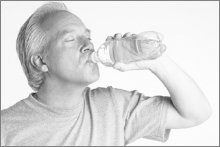Are You Dehydrated? Many People Are and Don't Even Know It!
by www.SixWise.com
When you drink less water than your body needs, the imbalance
can lead to serious problems. Water is crucial for survival
-- it's the base of all your body fluids, like blood and digestive
juices, it helps nutrients from your food get absorbed and
be transported, and it helps eliminate waste. Even becoming
mildly dehydrated (when you lose as little as 1 percent to
2 percent of your body weight) can seriously impact your body's
ability to function.
|

Feel thirsty? You're already mildly dehydrated. A key
to staying hydrated is to drink water before you feel
thirsty.
|
What Causes Dehydration?
In simple terms, dehydration results when your body does
not have as many fluids as it should. This is generally the
result of:
-
Losing too much fluid (due to vomiting, diarrhea, sweating,
fever or other illness)
-
Not drinking enough water (due to nausea, illness, being
too busy)
-
A combination of the two
Normally, adults lose over 10 cups of water daily, just from
sweating, eliminating waste, breathing and other routine functions.
You also lose electrolytes, which are minerals like sodium
and calcium that keep your body's fluids balanced. However,
go out for a jog, mow the lawn or neglect to drink as much
water as you should (during a long airplane flight or after
exercise, for instance), and your body will begin to dry out.
Even at a very mild dehydration level you'll have a lower
circulating blood volume. At a 2 percent loss of body weight,
athletic performance is affected. At a 3 percent to 5 percent
loss, reaction time, concentration and judgment are impacted.
Reach a 9 percent to 15 percent loss -- severe dehydration
-- and your life is in danger.
Signs You May be Dehydrated
If you're thirsty now, you're already mildly dehydrated.
That's because, contrary to popular belief, thirst is not
a reliable indicator of proper hydration. Ideally, you should
drink enough water so that you don't become thirsty, not wait
until you're feeling parched and then drink enough water to
quench your thirst.
According to the Mayo Clinic, rather than relying on thirst
as an indicator, check the color of your urine. If you're
well-hydrated, your urine will be clear or light colored.
If not, your urine will be dark yellow or amber. Dehydration,
at a mild to moderate level, can also cause these symptoms:
-
Excessive thirst
-
Fatigue
-
Inactivity in children
-
Dry mouth
-
Little urination (going eight hours or more without urination
for adults and older children, going through fewer than
six wet diapers a day for infants)
-
No tears when crying
-
Muscle weakness
-
Headache, dizziness, lightheadedness
|

If you're exercising, in hot weather or live in a high
altitude, you'll need extra water. So do the elderly,
infants and children, and pregnant and breastfeeding
women.
|
When dehydration becomes severe, the following symptoms may
occur (and should be treated as a medical emergency):
-
Extreme thirst
-
Irritability and confusion in adults, fussiness and sleepiness
in children
-
Very dry mouth, skin and mucous membranes
-
Lack of sweating and little to no urination
-
Sunken eyes and shriveled, dry skin without elasticity
-
Sunken fontanels (the soft spot on top of a baby's head)
in infants
-
Low blood pressure
-
Rapid heartbeat
-
Fever
-
Delirium or unconsciousness
Who's Most at Risk?
Anyone can become dehydrated (remember, if you ever feel
thirsty, it's because you're already mildly dehydrated), but
certain groups are more at risk. This includes:
-
Infants and children: They have low body weights and
sweating capacity, but they go through a high amount of
water and electrolytes. Meanwhile, diarrhea is common
in infants and children, and they may be reluctant to
take in fluids.
-
Older adults: As we get older, the body is able to conserve
less water. Your sense of thirst also becomes less acute
and your body does not respond to temperatures as well.
The elderly may also eat and drink less than other adults,
particularly when living alone or in a nursing home environment.
-
People with Illnesses: Certain chronic illnesses increase
the risk of dehydration. These include uncontrolled diabetes,
kidney disease, cystic fibrosis, alcoholism and adrenal
gland disorders. Sore throat, cold, fever and flu can
also increase the risk if you don't feel like drinking
or have vomiting or diarrhea.
-
Extreme athletes: People who participate in endurance
sports like marathons, triathalons, mountain climbing
and long-distance cycling are at high risk of dehydration.
Dehydration is cumulative, and during exercise you can
lose 24-32 ounces of water an hour (even more if it's
hot). The longer the exercise continues, the harder it
is to stay hydrated and the more your fluid debt accumulates.
People who live at high altitudes (8,000 feet or higher)
are also at an increased dehydration risk. In order to adjust
to the high altitude, your body will urinate more and breathe
faster, which means you need extra water to keep hydrated.
Focus on Staying Hydrated
It's commonly said that you should drink eight eight-ounce
glasses of water a day to stay healthy, but this is really
just a rule of thumb, as so many factors (weather, age, activity
level, health) affect how much water your body needs.
In general, you can prevent dehydration by focusing on staying
hydrated throughout the day. Keep water with you and drink
it regularly -- before you get thirsty. If it's hot outside
or you're exercising (or pregnant or breastfeeding), you'll
need even more fluids so drink more water.
In the case of illness, start drinking extra water (or giving
it to your child) right away (don't wait for signs of dehydration
to occur).
Remember, as soon as you're thirsty you're already dehydrated,
so drink enough water to prevent thirst (and be sure your
urine is clear or light yellow), and you should stay well-hydrated.
Recommended Reading
Bottled
Water: Which City's Tap Water System is Making a Flood of
Cash off of You?
The
Six Worst Lifestyle Choices You Could Make
Sources
The
Mayo Clinic
Medline
Plus Medical Encyclopedia